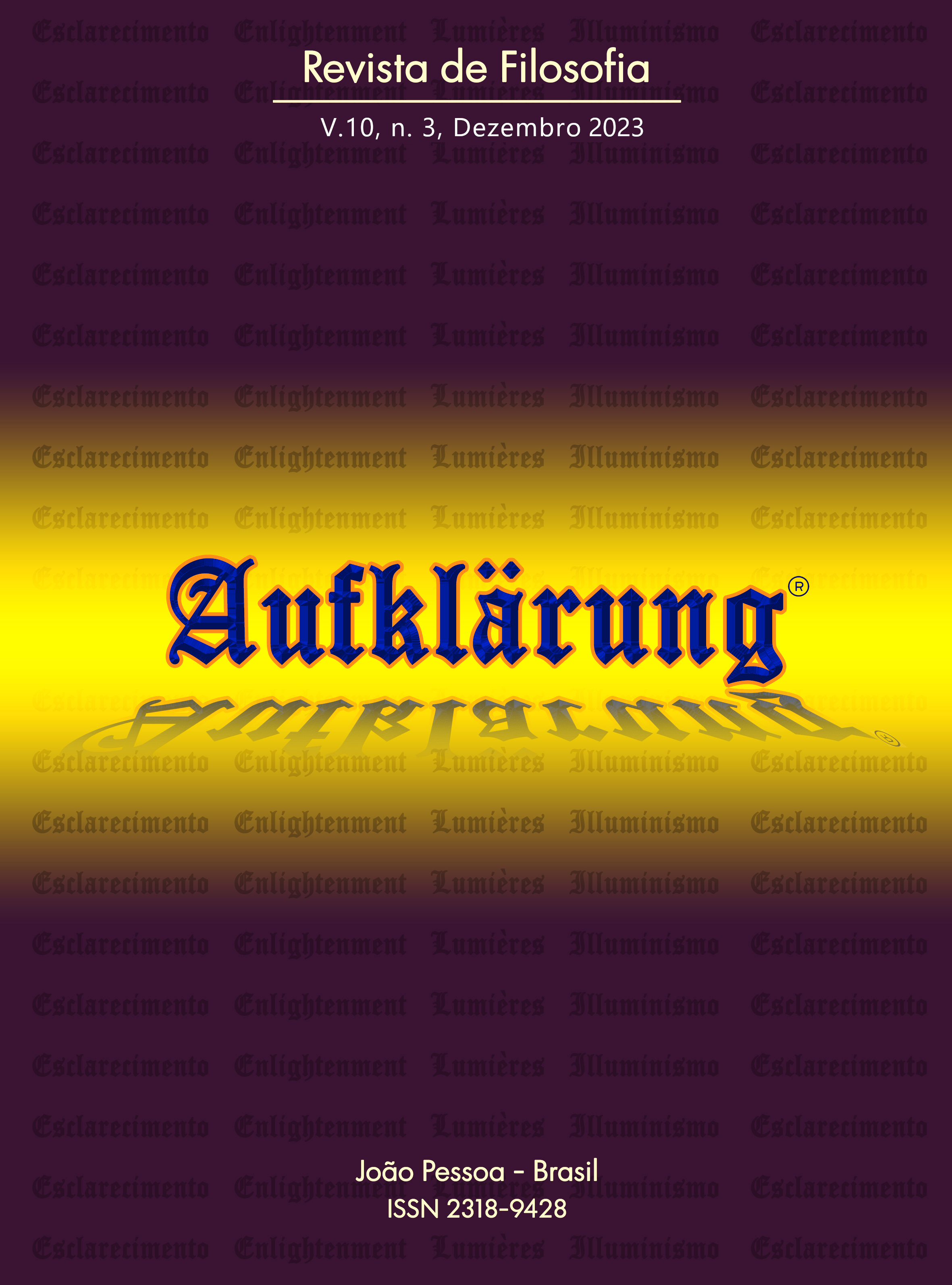As regras de redução são fáceis mesmo dentro de uma visão popperiana
DOI:
https://doi.org/10.18012/arf.v10i3.66174Palavras-chave:
Carnap, falseabilidade, modelos mentais, Popper, reduçãoResumo
Rudolf Carnap propôs três regras de redução para melhorar a linguagem científica. Essas regras indicam quando é correto adicionar uma propriedade em situações em que outras propriedades já são tidas. Assumindo a teoria dos modelos mentais, foi demonstrado que as regras não são difíceis de usar do ponto de vista cognitivo. A chave para argumentar isso é aceitar que a mente humana funciona como afirmam as teorias de processo dual. De acordo com essas teorias, as pessoas podem usar dois sistemas diferentes. Um deles implica esforço, mas o outro não. Assim, a ideia é que as regras de redução de Carnap podem ser aplicadas recorrendo apenas ao sistema não implicando esforço cognitivo. Este artigo vai um passo além e propõe que, mesmo sob uma perspectiva popperiana, as regras de redução continuam não sendo difíceis. Pode-se pensar que a falseabilidade requer esforço cognitivo porque precisa abordar situações em que as sentenças são falsas. No entanto, este artigo tenta explicar que, seguindo a teoria dos modelos mentais, isso não é difícil se as sentenças são condicionais, e as sentenças nas regras de redução têm estruturas condicionais.
Downloads
Referências
BARRES, Patricia E.; JOHNSON-LAIRD, Philip N. On imagining what is true (and what is false). Thinking and Reasoning, 9, 1, 1-42, 2003.
BYRNE, Ruth M. J.; JOHNSON-LAIRD, Philip N. If and or: Real and counterfactual possibilities in their truth and probability. Journal of Experimental Psychology: Learning, Memory, and Cognition, 46, 4, 760-780, 2020.
CARNAP, Rudolf. Testability and meaning. Philosophy of Science, 3, 4, 419-471, 1936.
CARNAP, Rudolf. Testability and meaning – Continued. Philosophy of Science, 4, 1, 1-40, 1937.
ESPINO, Orlando; BYRNE, Rurth M. J.; JOHNSON-LAIRD, Philip N. Possibilities and the parallel meanings of factual and counterfactual conditionals. Memory & Cognition, 48, 1263-1280, 2020.
JOHNSON-LAIRD, Philip N.; KHEMLANI, Sangeet; GOODWIN, Geoffrey P. Logic, probability, and human reasoning. Trends in Cognitive Sciences, 19, 4, 201-214, 2015.
JOHNSON-LAIRD, Philip N.; RAGNI, Marco. Possibilities as the foundation of reasoning. Cognition, 193, 2019.
KHEMLANI, Sangeet; BYRNE, Ruth M. J.; JOHNSON-LAIRD, Philip N. Facts and possibilities: A model-based theory of sentential reasoning. Cognitive Science, 42, 6, 1887-1924, 2018.
KHEMLANI, Sangeet; HINTERECKER, Thomas; JOHNSON-LAIRD, Philip N. The provenance of modal inference. In: GUNZELMANN, Glenn; HOWES, Andrew; TENBRINK, Thora; DAVELAAR, Eddy J. Computational Foundations of Cognition. Austin, TX: Cognitive Science Society, 2017. 663-668.
KHEMLANI, Sangeet; ORENES, Isabel; JOHNSON-LAIRD, Philip N. The negation of conjunctions, conditionals, and disjunctions. Acta Psychologica, 151, 1-7, 2014.
LÓPEZ-ASTORGA, Miguel. Reduction, intuition, and cognitive effort in scientific language. Logos & Episteme, XII, 4, 389-401, 2021.
LÓPEZ-ASTORGA, Miguel; RAGNI, Marco; JOHNSON-LAIRD, Philip N. The probability of conditionals: A review. Psychonomic Bulletin & Review, 29, 1-20, 2022.
POPPER, Karl. Conjectures and Refutations: The Growth of Scientific Knowledge. London, UK: Routledge and Kegan Paul, 1963.
POPPER, Karl. The Logic of Scientific Discovery. London, UK: Routledge, 2002.
QUELHAS, Ana Cristina; JOHNSON-LAIRD, Philip N.; JUHOS, Csongor. The modulation of conditional assertions and its effects on reasoning. The Quarterly Journal of Experimental Psychology, 63, 9, 1716-1739, 2010.
RESTALL, Greg. Logic: An Introduction. Montreal & Kingston, Canada: McGill-Queen’s University Press, 2006.
REYNA, Valerie F. How people make decisions that involve risk: A dual-process approach. Current Directions in Psychological Science, 13, 2, 60-66, 2004.
STANOVICH, Keith. On the distinction between rationality and intelligence: Implications for understanding individual differences in reasoning. In: HOLYOAK, Keith; MORRISSON, Robert. The Oxford Handbook of Thinking and Reasoning. New York, NY: Oxford University Press, 2012. 343-365.
STENNING, Keith; VAN LAMBALGEN, Michiel. The natural history of hypotheses about the selection task: Towards a philosophy of science for investigating human reasoning. In; MANKTELOW, Ken; CHUNG, Man Cheung. Psychology of Reasoning: Theoretical and Historical Perspectives. Hove, UK, and New York, NY: Psychology Press, 2004. 127-156.
Arquivos adicionais
Publicado
Como Citar
Edição
Seção
Licença

Este trabalho está licenciado sob uma licença Creative Commons Attribution 4.0 International License.
Política de Direito Autoral para os itens publicados pela Revista:
1.Esta revista é regida por uma Licença da Creative Commons aplicada a revistas eletrônicas. Esta licença pode ser lida no link a seguir: Creative Commons Attribution 4.0 International (CC BY 4.0).
2.Consonante a essa politica, a revista declara que os autores são os detentores do copyright de seus artigos sem restrição, e podem depositar o pós-print de seus artigos em qualquer repositório ou site.
Política de Direito de Uso dos Metadados para informações contidas nos itens do repositório
1. Qualquer pessoa e/ou empresa pode acessar os metadados dos itens publicados gratuitamente e a qulquer tempo.
2.Os metadados podem ser usados sem licença prévia em qualquer meio, mesmo comercialmente, desde que seja oferecido um link para o OAI Identifier ou para o artigo que ele desceve, sob os termos da licença CC BY aplicada à revista.
Os autores que têm seus trabalhos publicados concordam que com todas as declarações e normas da Revista e assumem inteira responsabilidade pelas informações prestadas e ideias veiculadas em seus artigos, em conformidade com a Política de Boas Práticas da Revista.






































